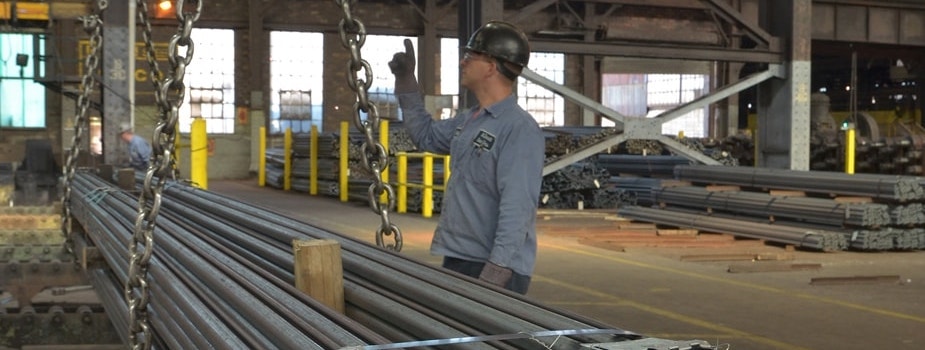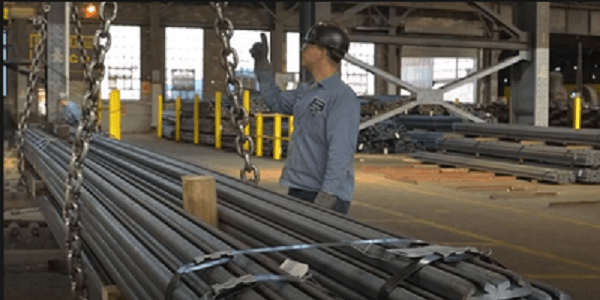For more than three decades the steel industry in general and McDonald Steel Corporation (MSC) in particular, have been leaders in the development and deployment of green manufacturing technology. During that time MSC and other companies have reduced emissions by 36%, recycled 95% of the water used in steel processing and have made steel the most recycled material in the world. As a result of our efforts more than 70% of all steel made in the U.S. today is produced sustainably.
Clearly our industry stands as a shining example of what the manufacturing sector can do to protect the environment, address climate change, and reduce the impact of global warming.
Recycled Steel from McDonald Steel
MSC’s commitment to sustainability is demonstrated by the fact that we source more than 93% of our billet steel from scrap yards and recycling facilities. Each and every year we convert hundreds of tons of old vehicles, appliances, and decommissioned industrial equipment into high quality hot rolled special steel shapes that are used by the industries that drive America’s economy, including railroads, bridge and road construction, heavy equipment manufacturing, agriculture, and water transmission.
And we are happy to report that the recent enactment of the Bipartisan Infrastructure and Recovery Act means we will have the opportunity to repurpose significantly more scrap and recycled steel in the years ahead.
Members of SMA: Steel Manufacturers Association
Our embrace of green technology is also reflected by our membership in the Steel Manufacturer’s Association (SMA). This widely-respected trade group is comprised of 25 companies that operate energy efficient electric arc furnaces (EAF). Along with producing more than two-thirds of the steel made in the U.S., SMA companies actively advocate for policies that promote sustainability and positive change, including:
- Trade and economic competitiveness: We support trade policies that strengthen domestic steel production, impose fair tariffs on imports, and reduce the import surges that threaten U.S. steel.
- Transportation and infrastructure: Infrastructure is an investment that protects our communities and everyday life. Bridges, roads, and railways must be constructed of high-quality steel to ensure safety and durability. We support domestic procurement initiatives like “Buy America,” which fuels the American economy while reducing environmental impacts.
- Energy self-sufficiency: EAF steelmaking has significantly reduced the carbon footprint of steelmaking in the United States. We continue to seek new techniques and clean energy sources to increase this positive impact.
- Environmental stewardship: Over the past half-century, EAF steelmakers have successfully reduced emissions, recycled steel for new projects, conserved water, and recycled wastewater. American EAF steelmakers emit 0.19 tons of carbon dioxide per ton of steel production while integrated steelmakers emit 1.9 tons of carbon dioxide producing the same amount of steel.
- Workforce engagement: We support STEM education and other programs that encourage young people to explore high-tech, high-paying careers in manufacturing. With the aid of scholarships, internships, and apprenticeships, the next generation of steelmakers will be prepared to advance environmentally responsible manufacturing into the future.
- Manufacturing agenda: We support domestic manufacturing, which reduces reliance on foreign goods and international supply chains.
- Raw materials: Because no country is self-sufficient in every raw material, we support the free and fair trade of these materials in compliance with the Organization of Economic Cooperation and Development (OECD) and World Trade Organization (WTO).
- Buy America: American tax dollars should stimulate the domestic economy. We encourage the government and large corporations to buy sustainable, American-made steel and other products for major projects in infrastructure and defense.
- Competing materials: Consumers and manufacturers should examine the benefits of steel versus wood or aluminum. Due to global deforestation, wood is not sustainable, and aluminum is corrosive and expensive to repair. Steel products may be recycled many times and have a total service life that surpasses that of competing materials.
Benefits of Green Steel Manufacturing
Green Steel manufacturing practices promote sustainability, protect the environment, and improve the quality of life in communities across the country in many ways:
- Low-carbon manufacturing: EAF steelmaking produces up to 75% fewer emissions than traditional steelmaking.
- 100% recyclable products: Steel products are infinitely and 100% recyclable. The same steel used on a railroad 50 years ago can be recycled and used to build a bridge 50 years from now.
- High-wage manufacturing jobs: Domestic steel production strengthens our economy by preserving and creating high-wage jobs here in McDonald and across the nation.
- American-made: Products made in the United States are held to American standards for quality, worker safety, and environmental responsibility.
Green has always been McDonald Steel’s favorite color. We’re proud to work with a material that can be infinitely recycled, and we are totally and completely committed to reducing the environmental impact of the production processes that produce the steel that will continue to serve as the backbone of America’s economy well into the 21st Century.
About McDonald Steel
Since McDonald Steel was founded in 1981 the company has been a leading domestic producer of highly-engineered hot rolled steel special shapes. We hold ISO 9001:2015 and LEED certification and are devoted to sustainable practices, innovation, employee safety, and our community.
Contact us to learn more about our sustainable initiatives as well as our hot rolling, finishing, and tooling capabilities.


